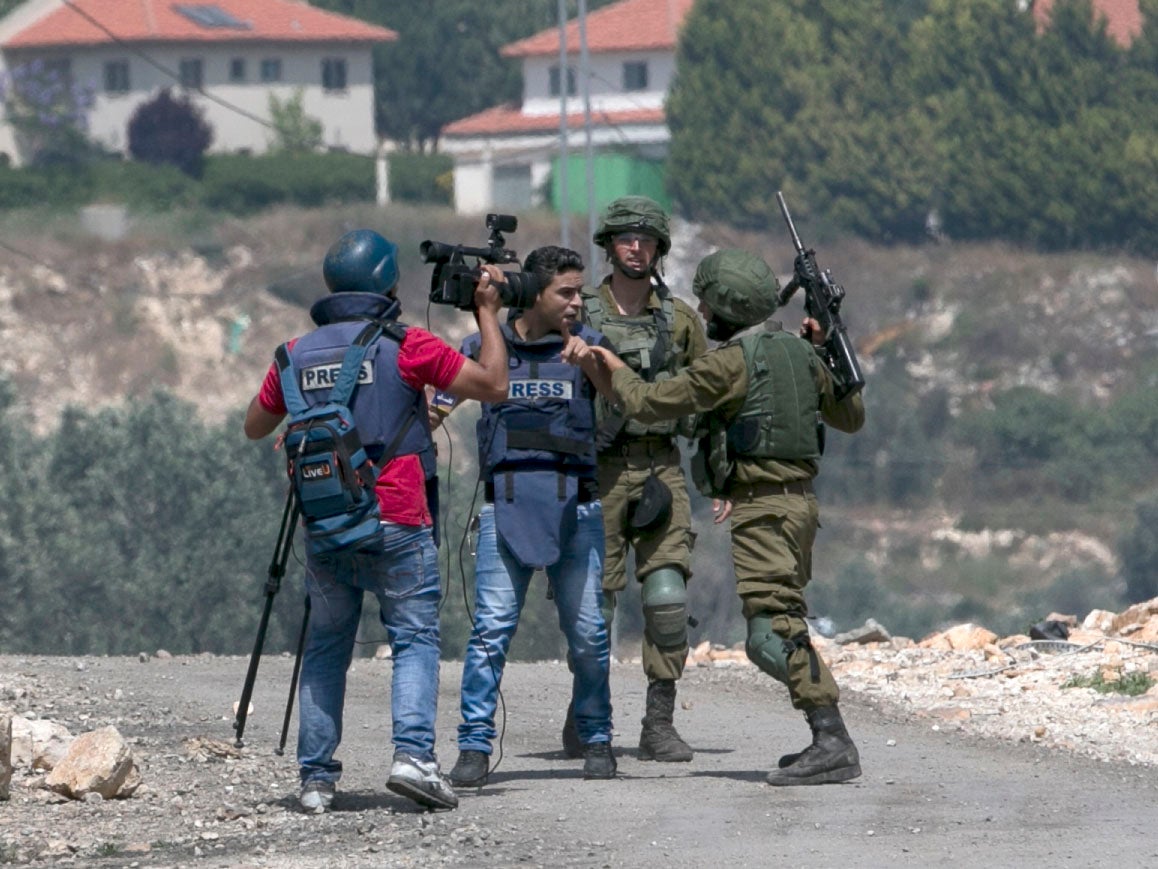Israel considering law to ban photographing or filming of IDF soldiers
Bill aims to 'silence criticism of the army', critics say

Your support helps us to tell the story
From reproductive rights to climate change to Big Tech, The Independent is on the ground when the story is developing. Whether it's investigating the financials of Elon Musk's pro-Trump PAC or producing our latest documentary, 'The A Word', which shines a light on the American women fighting for reproductive rights, we know how important it is to parse out the facts from the messaging.
At such a critical moment in US history, we need reporters on the ground. Your donation allows us to keep sending journalists to speak to both sides of the story.
The Independent is trusted by Americans across the entire political spectrum. And unlike many other quality news outlets, we choose not to lock Americans out of our reporting and analysis with paywalls. We believe quality journalism should be available to everyone, paid for by those who can afford it.
Your support makes all the difference.Israel’s parliament is to consider a law banning the photographing or filming of soldiers, in what critics claim is a “dangerous” attempt to undermine scrutiny of the Israeli Defence Forces (IDF).
Under the proposed legislation, entitled the “Prohibition against photographing and documenting IDF Soldiers”, those found photographing troops “with the intention of undermining the spirit” of the army can be punished by up to 10 years in prison.
“Anyone who filmed, photographed, and/or recorded soldiers in the course of their duties, with the intention of undermining the spirit of IDF soldiers and residents of Israel, shall be liable to five years imprisonment,” says the bill, proposed by Robert Ilatov, a member of the Knesset and the chairman of the right-wing nationalist Yisrael Beiteinu party.
“Anyone intending to harm state security will be sentenced to 10 years’ imprisonment.”
The proposal is being discussed in the wake of the deadliest day in the Gaza Strip since the 2014 war. Medical officials said least 60 Palestinians were killed and thousands wounded on 14 May when Israeli troops fired at demonstrators protesting Israeli occupation.
Explanatory notes accompanying Mr Ilatov’s bill, which is reportedly supported by Defence Minister Avigdor Liberman, say: “For many years now, the state of Israel has witnessed a worrying phenomenon of documentation of IDF soldiers.
“This is done through video and stills and audio recordings by anti-Israel and pro-Palestinian organisations such as B’Tselem, MachsomWatch women [who monitor soldiers’ behaviour at checkpoints], Breaking the Silence and various BDS organisations. In many cases, the organisations spend whole days near the IDF soldiers waiting impatiently for activities that can be biased and tendentious – and through them they can be disgraced.”
The notes continue: “Documentation is usually done while interfering with IDF soldier’s ongoing operational activities, sometimes even shouting accusations and insults against them. Most of these organisations are supported by associations and governments with a clear anti-Israeli agenda, which use these tendencies to harm the State of Israel and its security.
“It’s time to put an end to this absurdity, and it’s inconceivable that every leftist operative or organisation supported by foreign entities will have free access to document IDF soldiers unhindered while carrying out their duties.
“We have a responsibility to provide IDF soldiers with optimal conditions for carrying out their duties, without having to worry about a leftist or organisation who might publish their picture to shame and disgrace them.”
An editorial in Israeli newspaper Haaretz on Sunday condemned the bill, calling it “dangerous” and saying its aim was to “to silence criticism of the army, and in particular to prevent human rights organisations from documenting the Israeli army’s actions in the territories”.
The proposed legislation not only attempted to block reporting that undermined the “spirit” of the army and Israeli residents, the editorial said, but would impose a blanket ban on recording the actions of soldiers.
“The immediate result of such a prohibition is serious harm to the possibility of protecting human rights and overseeing the army’s activity.
”The bill does serious harm to freedom of the press and the public’s right to know. The public has a right to know what the reality is and especially what the ‘people’s army; is doing in its name and on its behalf.”
The violence in Gaza has tapered off since 14 May but there are still sporadic flare-ups. At least 113 Palestinians have been killed since border protests began on 30 March, which demand the right of return for Palestinian refugees and their descendants to land and homes lost to Israel during its founding in a 1948 war.
Gaza has been controlled since 2007 by the Islamist group Hamas. Israel has blamed the group for provoking the violence.
Video footage and photographs showing the actions of Israeli soldiers have often become the source of high-profile investigations into their conduct.
In perhaps the most prominent among these in recent years, Elor Azaria was sentenced to a year and a half in prison for fatally shooting a Palestinian assailant in the head as he lay immobilised on the ground in 2016, only for the sentence to be cut by a third in March. He was freed earlier this month.
Join our commenting forum
Join thought-provoking conversations, follow other Independent readers and see their replies
Comments